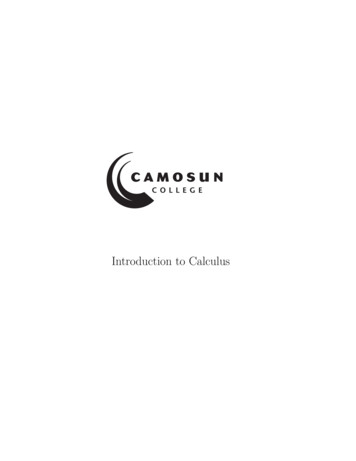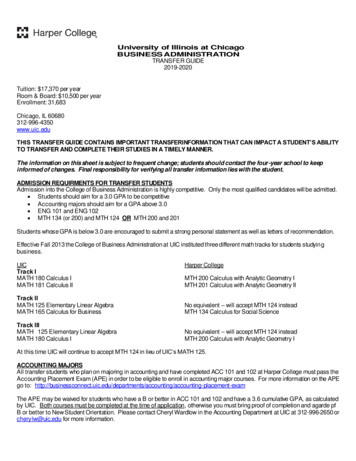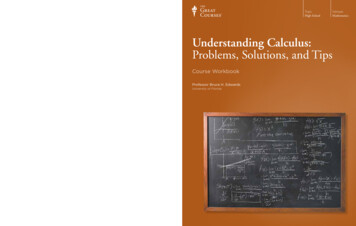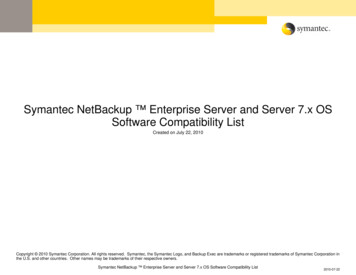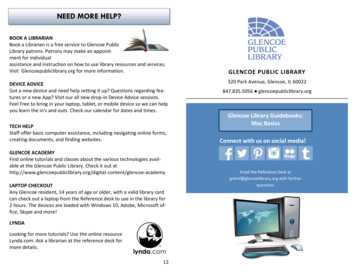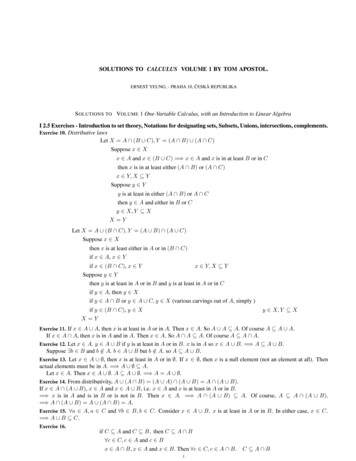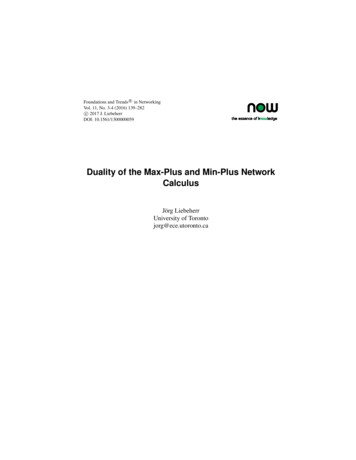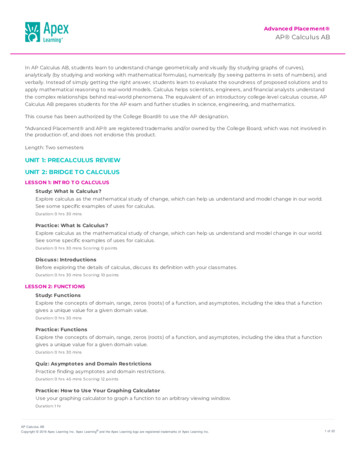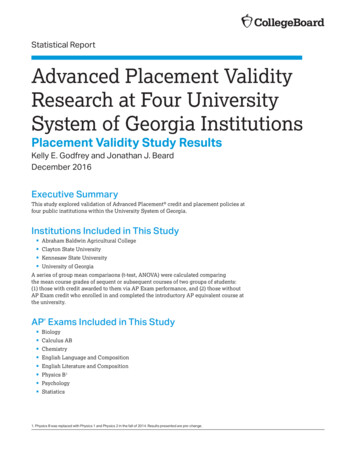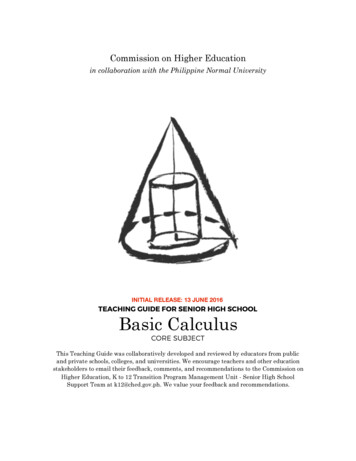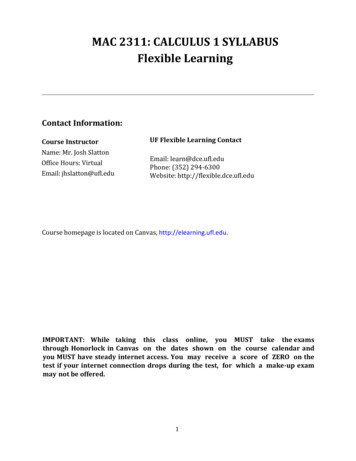
Transcription
MAC 2311: CALCULUS 1 SYLLABUSFlexible LearningContact Information:Course InstructorName: Mr. Josh SlattonOffice Hours: VirtualEmail: jhslatton@ufl.eduUF Flexible Learning ContactEmail: learn@dce.ufl.eduPhone: (352) 294-6300Website: http://flexible.dce.ufl.eduCourse homepage is located on Canvas, http://elearning.ufl.edu.IMPORTANT: While taking this class online, you MUST take the examsthrough Honorlock in Canvas on the dates shown on the course calendar andyou MUST have steady internet access. You may receive a score of ZERO on thetest if your internet connection drops during the test, for which a make-up exammay not be offered.1
MAC 2311 Calculus 1 CoursePolicies and Syllabus1. Introduction(a) Course Contentpage 3(b) Prerequisitespage 3(c) Required Materialspage 3(d) E-Learning in Canvaspage 3(e) Lecture Videospage 3(f) Successpage 4(g) Students with Disabilitiespage 4(h) Academic Honestypage 52. Testing(a) Semester Examspage 5(b) Final Exampage 6(c) Important Exam Policiespage 63. Grading(a) Course Gradepage 7(b) Lecture Quizzespage 7(c) WebAssign Online Homeworkpage 8(d) WebAssign Online Quizzespage 8(e) Examspage 8(f) Extra Creditpage 8(g) Make-up Policies and Extensions page 9(h) Incomplete Gradepage 94. General Education Informationpage 105. Online Course Evaluationpage 116. Diversity and Inclusionpage 117. Algebra and Trigonometric Formulas page 122
MAC 2311 Flexible Learning2. INTRODUCTION2a COURSE CONTENT: MAC 2311 is the first in the three-semester sequence MAC 2311,MAC 2312, MAC 2313 covering the basic calculus. Intended topics will include limits,differentiation, applications of the derivative and introduction of integration.A minimum grade of C (not C ) in MAC 2311 satisfies four credits of general educationrequirement and also satisfies the pure math portion of the state Writing/Mathrequirement.This is an ONLINE VERSION of MAC 2311 all content is delivered online. Studentsview 32 online lectures and complete lecture quizzes in the course management systemCanvas, and complete online homework and quizzes using WebAssign. Students areencouraged to post questions and answers on the course discussion board in Canvas.Three semester exams and a final are posted in Canvas and administered throughHonorlock.2b PREREQUISITES: MAC 2311 assumes that you have essential precalculus skills (bothalgebra and trigonometry) necessary to succeed in calculus. Students should be able todo arithmetic without a calculator.To enroll in MAC 2311, you must have earned a grade of C or better in MAC 1147 (orits equivalent, both MAC 1140 and MAC 1114), earned calculus credit through an examor earlier coursework, or have taken the ALEKS placement assessment and attained therequired minimum score. You may take the ALEKS assessment through the StudentSelfService homepage; click on Placement under My Online Services. For more completeinformation, check the page student.ufl.edu/aleksinfo.html. Note the followingparagraph: “The Department of Mathematics encourages you to take the assessmenteven if you have met one of the prerequisites for MAC 2311. Quite often, your algebraand trigonometry skills may need review and your placement assessment can provideinformation and specific areas for additional study.”MAC 2311 begins with a short review of precalculus topics including a diagnostic testin WebAssign. You should already be competent in working this material. Westrongly recommend that students who are having difficulty with the precalculusreview material consider first taking MAC 1147, a four credit precalculus coursereviewing essential calculus skills. You may switch courses on ONE.UF during thedrop- add period.2c REQUIRED MATERIALS:Textbook: Calculus: Early Transcendentals, 9th Edition by StewartIt is required that you have a WebAssign code for doing online homework. To purchasethe text and WebAssign access code, you have the choice to “opt-in” to WebAssignaccess and the e-book through CANVAS once classes begin for a reduced price of 62.50and pay for these materials through your student account. The opt-in option is most2
MAC 2311 Flexible Learningcost effective and the link to opt-in is provided in the Course Introduction page onCANVAS.There is also a loose-leaf print version of the customized textbook available at the UFBookstore for students who wish to have a printed resource.Computer access and requirements: All assignments should be taken on a computer,not cell phone or tablet, since there may be compatibility issues with Canvas andWebAssign. Be sure you are using a browser that works with WebAssign. Please checkfor WebAssign browser recommendations. Any WebAssign questions should bedirected to your instructor and/or the WebAssign Student Support 1-800-955-8275. Inparticular it has been noted that Safari has some issues with Canvas, so it isrecommended that you do not use Safari when accessing assignments on Canvas.Calculators: No calculators are allowed on exams. However, a graphing calculatorand WolframAlpha are useful as a study and learning tool when used appropriately,but they are not essential. Remember that Calculus is a collection of ideas that arenot mastered through calculator skills.2d E-LEARNING IN CANVAS: UF Online’s course management system, is accessed throughelearning.ufl.edu. All course information including the course homepage, syllabus, andexam information are posted on this site. In addition, there is a mail tool and discussionforum for communication.All grades are posted in Canvas. You are responsible for verifying that those gradesare accurate.Please note: Important course information is clearly communicated in this courseguide and assignments and course materials are easily accessible through the Canvasmodules. If you cannot find your answer in the resources above, there is also aDiscussion Forum available in Canvas. Please use this to post questions and tosupply answers to your fellow students. Your instructor will check thediscussion forum regularly.2e LECTURE VIDEOS: The lecture and additional example videos provide the mainpresentation of course material, and are accessed through the Canvas modules. To staycurrent with the course, we recommend watching the videos weekly following theschedule posted on the course calendar. You should watch the lectures and answerthe corresponding Lecture Quiz Questions before attempting homework. Youmay contact your instructor or post questions on the course discussion board if youneed clarification of a topic.3
MAC 2311 Flexible LearningLecture notes outlines: You can download and print them out from each module pagein Canvas. It is important that you should have a copy of the lecture notes in order tofollow the lecture easier when watching the videos.2f SUCCESS: Other than having a strong precalculus background, success in MAC 2311depends largely on your attitude and effort. It is not effective to watch a video and copynotes without following the thought processes involved in the lecture. For example,you should try to answer the questions posed by your lecturer. Students who do notactively participate have much more difficulty. For that reason there are lecture quizquestions included in each lecture which you will answer in Canvas as part of your finalgrade.However, be aware that much of the learning of mathematics at the university takesplace outside of the classroom. You need to spend time reviewing the concepts of eachlecture from the videos and textbook before you attempt homework problems. It isalso important to look over the textbook sections to be covered in the next lecture tobecome familiar with the vocabulary and main ideas before watching the video. Thatway you will better be able to grasp the lecture material. As with most college courses,you should expect to spend a minimum of 3 hours working on your own for every hourof classroom instruction. You should therefore plan to spend at least 12 hours eachweek on this online course including the time spent watching the lecture videos.It is critical that you keep pace with the course material as presented in the module foreach week. Do not fall behind. Ask questions either during online office hours or onthe discussion board; do not let misunderstandings go unanswered. You should checkthe discussion board regularly, posting questions and answers for fellow students. Theeffort of asking questions and communicating ideas clearly, as well as the practice ofwriting solutions, are effective tools in helping you better understand calculusconcepts. This is YOUR forum, take advantage of it by participating in it.In studying calculus, you must be careful not to let a tutor, friend, or calculator “think”for you. Be sure that you can work problems completely on your own, without help, bythe time of a quiz or exam.Our hope is that through focused study and practice you will gain a realappreciation for the important concepts of calculus and their application. Wewant you to succeed in this class! But you must keep up with the course materialand take the initiative to get help in time, before you get too far behind. Studentswith a positive attitude who are intellectually engaged in learning the materialwill get the most from the course.2g STUDENTS WITH LEARNING DISABILITIES: Students requesting class and examaccommodations must first register with the Dean of Students Office DisabilityResource Center (DRC), https://disability.ufl.edu/. The DRC will provide adocumentation letter to the student to present to your instructor, Josh Slatton. This must bedone as early as possible in the semester, at least one week before the first exam, sothere is4
MAC 2311 Flexible Learningadequate time to make proper accommodations and the accommodations are notretroactive.2h ACADEMIC HONESTY: Remember that you committed yourself to academic honestywhen you registered at the University of Florida by agreeing to the Honor Pledgebelow:The Honor PledgeWe, the members of the University of Florida community, pledge to hold ourselves andour peers to the highest standards of honesty and integrity by abiding by the HonorCode.On all work submitted for credit by students at the University of Florida, the followingpledge is either required or implied:“On my honor, I have neither given nor received unauthorized aid in doing thisassignment.”Academic Honesty Guidelines: “All students are required to abide by the AcademicHonesty Guidelines which have been accepted by the University. The academiccommunity of students and faculty at the University of Florida strives to develop,sustain and protect an environment of honesty, trust and respect. Students areexpected to pursue knowledge with integrity. Exhibiting honesty in academic pursuitsand reporting violations of the Academic Honesty Guidelines will encourage others toact with integrity. Violations of the Academic Honesty Guidelines shall result in judicialaction and a student being subject to the sanctions in paragraph XIV of the Student Codeof Conduct.”The Mathematics Department expects you to follow the Student Honor Code. We arebound by university policy to report any instance of suspected cheating to the properauthorities.You may find the Student Honor Code and read more about student rights andresponsibilities concerning academic honesty at the link www.dso.ufl.edu/sccr/.In addition, we remind you that lecture videos are the property of theUniversity/faculty member and may not be used for any commercial purpose. Studentsfound to be in violation may be subject to discipline under the Student Conduct Code.3. TESTING3a SEMESTER EXAMS: During the semester, three tests will be given between on the datesshown on the course calendar. The exams will be given in Canvas and administeredthrough Honorlock. You will be given a 90 minute time limit once you start each exam.Each exam will be scored on a scale of 0 to 80 points.Average/Replace policy: The lowest of the three semester exams will be replaced bythe average of the three semester exams. This average/replace policy will help tominimize the impact of a single poor performance but it will not completely disappear.5
MAC 2311 Flexible Learning3b FINAL EXAM:This will be given in exactly the same manner as the 3 semester exams except youwill have 120 minutes to complete the Final Exam.Missing an exam due to negligence, however, will result in a minimum 10-pointpenalty.Note: You may not use a calculator or any other study aid for exams. Be sure to readthe Honorlock handout thoroughly to understand the exam procedures before youstart a test.3c IMPORTANT EXAM POLICIES: MAC 2311 requires that students take exams throughHonorlock online on the listed dates. There are no exceptions to this. Students withconflicts, including regularly scheduled classes or traveling, must make advancearrangements to be present at the test.The following applies to all exams:(1) Students are responsible for material covered in lectures, reading assignments,and text problems. Questions will test mastery of concepts and include challengingcalculation problems. A command of related algebraic and trigonometricconcepts is assumed (see the Prerequisites, page 13, in this guide).(2) In order to use Honorlock and take the Exams you will need a computer/device,webcam, and stable internet access. You will need to be using the Google Chromebrowser (https://www.google.com/chrome/) and download the HonorlockExtension for Chrome (www.honorlock.com/extension/install). You can see theHonorlock Student Guide linked below for information on how to download anduse Honorlock.(3) Bring only the following while taking an exam with Honorlock: two picture IDs (UFGator One card and your state driver’s license) with a legible signature and blankscratch paper (up to 10 sheets).Cell phones and other electronic devices must be turned off and out of sight.They cannot be on the working area while you are taking an exam. If anysuch device rings or buzzes, your test will be considered to be compromised.Please see the Honorlock Student Guide at Honorlock Student Guide and the bestpractices guide at Honorlock Best PracticesSee Section 4f for the Exam Make-up Policies.6
MAC 2311 Flexible Learning4. GRADING4a COURSE GRADE: Your course grade is based on 500 points accumulated as follows:10 WebAssign Quizzes (best 10 of 12)WebAssign AssignmentsLecture Quizzes3 Semester ExamsFinal ExamTotal Points806020240100500The total sum of points is your numerical score, which will be converted to a lettergrade according to the following scale. The course grade is determined by thenumber of points you earn, not by the percentage, and will be strictly enforced.There will be no additional curve in this course, and extra assignments forindividual students to improve a grade are NOT possible.A450 - 500 pts (90%)CA 330 - 359.99 pts(66%)315 - 329.99 pts(63%)300 - 314.99 pts(60%)285 - 299.99 pts(57%)270 - 284.99 pts(54%)0 - 269.99 pts435 - 449.99 ptsC (87%)B 420 - 434.99 ptsD (84%)B400 - 419.99 ptsD(80%)B 380 - 399.99 ptsD (76%)C 360 - 379.99 ptsE(72%)*NOTE A grade of C DOES NOT give Gordon Rule or General Education credit!For those taking the S-U option:S [330 - 500 points]U [0 - 329.99 points]Approval of the S-U option must be obtained from Josh Slatton as well as FlexibleLearning. The deadline for filing an application with the Registrar and furtherrestrictions on the S-U option are given in the Undergraduate Catalog.For a complete explanation of current policies for assigning grade points, refer to theUF undergraduate catalog: des.aspx4b VIDEOS and LECTURE QUIZZES: Viewing the lecture presentations is an importantaspect of the learning process. Videos are accessed through the modules in Canvas.There are 2-3 lecture quiz questions to be completed with each lecture and you have 2tries per each lecture quiz. You may earn up to 20 points by completing lecture quizzesby the specified due date.7
MAC 2311 Flexible LearningYou should work these problems as you watch the lectures and then enter youranswersdirectly in Canvas. We encourage you to use the text as well as the videos to helpanswer these questions.4c WEBASSIGN ONLINE HOMEWORK: The online homework administered onWebAssign is planned to review concepts and provide practice of the lecture material.During the course of the semester, online assignments will be assigned on a routinebasis and must be completed before the due dates listed in the course calendar. Yourtotal score on online homework assignments will count up to a maximum 60 points,but the total number of points available is higher to offset credit lost due to technicaldifficulties or a missed assignment.The homework problems are graded by WebAssign and your score is immediatelyavailable after submitting your work. You will have multiple attempts for eachproblem; there are aids and a link to the ebook to help you solve each question.Do not try to complete an assignment in one sitting; start early instead of waitinguntil the due date to avoid missing the deadline.4d WEBASSIGN ONLINE QUIZZES: Twelve quizzes will be posted in WebAssign to be dueon the dates listed in the Quiz/HW calendar. You will have 45 minutes to complete anonline quiz; the clock starts from the time you open your quiz. Each quiz will be gradedon a scale of 0 to 8 points, and the top ten scores will count, to total up to 80 points. DONOT wait until the last minute to submit your quiz; we will NOT extend time forcomputer issues or WebAssign server problems.Like an in class quiz, you will not know if your answers are correct when you take aquiz and you will not see any results until the due date has passed. After the due date,you may see your quiz scores and review the questions missed in the WebAssigngradebook.NOTE: WebAssign Homework, quizzes and Lecture Quizzes account for 160 points ofthe total to be earned in the course. They are a significant part of your grade, toreflect their importance in understanding course concepts.4e EXAMS: Three semester exams and a cumulative final exam are given online in Canvas.Your exam grade will be available in Canvas gradebook once your exam is submitted.The MAC 2311 exams are not released to students, but you may request a private onlineconference or visit instructor’s office hours to review your exam within one week ofthe exam.4f EXTRA CREDIT: You may earn additional points in the following ways: COURSE PARTICIPATION (8 points): We encourage you to utilize instructor’svirtual office hours and the MAC 2311 Discussion Board regularly to ask andanswer questions about course material and homework. You can earn up to 4bonus points to participate in virtual office hours and up to additional 4 points by8
MAC 2311 Flexible Learningresponding to other students’ math questions. Answers must be appropriate andrelate to course material to earn credit. EXAM PREPARATION (20 points): An exam review sheet is posted in Canvas foreach test and students can earn up to 2 bonus points by submitting their work oneday before the test. In addition, a bonus exam review assessment will be availablein CANVAS before each test and the assessment will include questions fromprevious MAC 2311 exams so that you will have a flavor of the type of questionsthat you will see on the actual test.4g MAKE-UP POLICIES AND EXTENSIONS:. EXTENSIONS ON WEBASSIGN HOMEWORK: While it is a much better strategy towork ahead, occasionally you may fall behind. You can request an extension onWebAssign homework within 1 day after the deadline and you will have 24 hoursto complete it after extension request. The extension must submit in WebAssigndirectly. However, there will be a 20% grade penalty for those problemscompleted after the original due date for the assignment. MAKE-UP WEBASSIGN QUIZZES: We offer 2 drops on WebAssign quizzes, so wedo not provide make-ups for online quizzes. To allow time for computer issues, itis recommended not to wait until final hours on the due day to start your quizzes. MAKE-UP LECTURE QUIZZES: There are 23 points available in lecture quizzesbut you may only earn up to 20 points, so we do not offer make-ups. MAKE-UP EXAMS: Students must provide valid documentation for requesting amake-up exam due to a scheduling conflict. If illness or other extenuatingcircumstances force you to miss an exam, contact Josh Slatton as soon aspossible (no later than 24 hours after the exam) for approval to schedule amake-up exam. We do not consider traveling or lack of internet access as a validexcuse for a make-up exam. OTHER MAKE-UPS: There are no make-ups on any extra credit assignments.4h INCOMPLETE GRADE: A student who has completed a major portion of the coursewith a passing grade but is unable to complete the final exam or other courserequirements due to illness or emergency may be granted an incomplete, indicated bya grade of I. This allows the student to complete the course within the first six weeksof the following semester. The grade of “I” is never used to avoid an undesirablegrade, and does not allow a student to redo work already graded or toretake the course. See the official policy at es/.9
MAC 2311 Flexible Learning5. GENERAL EDUCATION INFORMATIONMAC 2311 has been designated a General Education course that can be counted towards theMathematical Science (M) requirement.Course Objective – The General Education Objectives for Mathematics courses:“Courses in mathematics provide instruction in computational strategies in fundamentalmathematics including at least one of the following: solving equations and inequalities, logic,statistics, algebra, trigonometry, inductive and deductive reasoning. These courses includereasoning in abstract mathematical systems, formulating mathematical models andarguments, using mathematical models to solve problems and applying mathematicalconcepts effectively to real-world situations.”The primary goal of the course is to help students understand and apply the fundamentalprinciples of differential and integral calculus. These objectives are accomplished throughthe lectures, homework, quizzes and discussion sections.Student Learning Outcomes (SLOs) – The general education student learning outcomesdescribe the knowledge, skills and attitudes that students are expected to acquire whilecompleting a general education course at the University of Florida.I.Content: Content is knowledge of the concepts, principles, terminology andmethodologies used within the discipline. Students demonstrate competence in theterminology, concepts, theories and methodologies used within the discipline. Understand the fundamental concept of limit. Understand the definition of the derivative and be competent at calculating derivativesusing the product, quotient, and chain rules. Understand the definition of the definite integral via Riemann sums and gaincompetence in evaluating them directly from the definition.II.Communication: Communication is the development and expression of ideas inwritten and oral forms. Students communicate knowledge, ideas and reasoning clearly andeffectively in written and oral forms appropriate to the discipline. Communicate mathematical findings clearly and effectively using written and/orgraphic forms.III.Critical Thinking: Critical thinking is characterized by the comprehensive analysisof issues, ideas, and evidence before accepting or formulating an opinion or conclusion.10
MAC 2311 Flexible LearningStudents analyze information carefully and logically from multiple perspectives, usingdiscipline specific methods, and develop reasoned solutions to problems. Apply techniques of derivatives and critical thinking effectively to solve appliedproblems including related rates and optimization problems. Analyze properties of functions using derivativesincrease/decrease, inflection points, local maxima/minima.includingregionsof Apply the Fundamental Theorem of Calculus to the evaluation of definite integrals andunderstand the link between differentiation and integration.These SLOs are assessed through weekly homework assignments and quizzes, threesemester exams, and final exam.6. ONLINE COURSE EVALUATIONStudents are expected to provide professional and respectful feedback on the quality ofinstruction in this course by completing course evaluations online via GatorEvals. Guidanceon how to give feedback in a professional and respectful manner is available at https://gatorevals.aa.ufl.edu/students/. Students will be notified when the evaluation period opens,and can complete evaluations through the email they receive from GatorEvals, in theirCanvas course menu under GatorEvals, or via https://ufl.bluera.com/ufl/. Summaries ofcourse evaluation results are available to students at https://gatorevals.aa.ufl.edu/ publicresults/.7. DIVERSITY AND INCLUSIONThe Mathematics Department is committed to diversity and inclusion of all students. Weacknowledge, respect, and value the diverse nature, background and perspective of studentsand believe that it furthers academic achievements. It is our intent to present materials andactivities that are respectful of diversity: race, color, creed, gender, gender identity, sexualorientation, age, religious status, national origin, ethnicity, disability, socioeconomic status,and any other distinguishing qualities.This syllabus is subject to change. You will be notified if any changes are made.11
MAC 2311 Flexible LearningPREREQUISITES FOR MAC 2311This course assumes that you have a sound precalculus background. The following is a summary of some important concepts used in solvingcalculus problems. The textbook provides a more complete review of these essential topics.ALGEBRA1.Basic Geometric Formulas: (b base, l length, h height, w width)Triangle: area Circle: area πr2; circumference 2πrParallelogram: area bhRectangular box: volume lwhSphere: volume ; surface area 4πr2Right circular cylinder: volume πr2h;surface area 2πrh 2πr2 Right circular cone: volume ;surface area πr r2 h2Facts about similar trianglesPythagorean theorem: x2 y2 z2yz2.xBasic Functions and their graphs:2; f(x) x3; f(x) x ; f(x) x; f(x) 1/x;f(x) x; f(x) x f(x) bx, b 0 and b 6 1, such asf(x) 2x3.Factoring:x3 y3 (x y)(x2 xy y2); x3 y3 (x y)(x2 xy y2); etc.12
MAC 2311 Flexible Learning4.Fractions:, etc.5.Exponents: xnyn (xy)n; xnxm xn m;6.Roots, including rationalizing the denominator or numerator., etc.7.Inequalities and absolute values: x a a x a; x ax a or x a8. Equation solving: Finding solutions for x ifax b 0; ax2 bx c 0; etc.9. Logarithms: If x 0, loga x y if and only if x ay If m 0 and n 0, thenlog(nm) log(n) log(m)loglog(nc) clog(n)TRIGONOMETRY1. Identities:sin( θ) sinθcos( θ) cosθ 1sectan( θ) tanθcsc2θ 1 cot2 θ2. Sum and Difference Formulas: sin(A B) sinAcosB cosAsinB3. Double Angle Formulas: sin2θ 2sinθcosθ cos2θ cos2 θ sin2 θ 2cos2 θ 1 1 2sin2 θ4. Half-Angle Formulas:5. Trigonometric Values:13
MAC 2311 Flexible Learningθ0π/6sinθ01/2 cosθ1π/4 2/203/23/33/2π/21 2/2 tanθπ/3 11/2 30undef14
MAC 2311 Flexible Learning15
MAC 2311 Flexible LearningFlexible Learning PoliciesDisability Accommodations:The Disability Resource Center in the Dean of Students Office provides students and faculty with informationand support regarding accommodations for students with disabilities. Staff at the Disability Resource Centerwill assist any student who registers as having a disability. Official documentation of a disability is required todetermine eligibility for appropriate accommodations. The professional employees at the Disability ResourceCenter serve as full-time advocates for students with disabilities ensuring students have physical andprogrammatic access to all college programs. One of the services provided by the Disability Resource Centerincludes: Testing dated-testing-requestStudents with disabilities who need to drop a course due to disability-related reasons are permitted to petitionfor additional drops. Find more information by contacting the Disability Resource Center (DRC).The Flexible Learning Office needs to be notified of any special accommodations required by thestudent when they begin their course by emailing the Accommodations Letter to learn@dce.ufl.edu.Course Deadline and Extension Policy:Students are allowed 16 weeks, from their date of enrollment, to complete and submit their coursework. If thestudent has not submitted at least 50% of their coursework and have an extenuating circumstance preventingthem from submitting the coursework, a failing grade of “E”, “E0” or “E1” will be issued and recorded to the UFRegistrar.If the student has made sufficient academic progress, which is defined as completing and submitting at least50% of the coursework and have an extenuating circumstance, the student may petition the instructor for acourse extension before the course expires. Each course extension request will be administratively evaluated.Instructors are not required to allow extensions. If a student does receive an extension, an incomplete grade ofan “I” will be assigned as an interim grade. When the course is completed, the instructor will initiate the changeof grade. After that, the “I” grade will be changed to the student’s final course grade on their transcript.Course Cancels and Course Drops:A Course Cancel:A tuition refund may be granted after a student submits a written request within 30 days of enrollment to theFlexible Learning Office. This request must be in writing by learn@dce.ufl.edu. Refunds will be the amount oftuition, less 25.00 per course. If a credit card was used, the refund will be credited a back to the card. At thetime of cancel, a refund can be issued for course materials. No refunds are granted after 30 days.Course Drop:Dropping a
Textbook: Calculus: Early Transcendentals, 9th Edition by Stewart It is required that you have a WebAssign code for doing online homework. To purchase the text and WebAssign access code, you have the choice to “opt-in” to WebAssign access and the e-book throug
